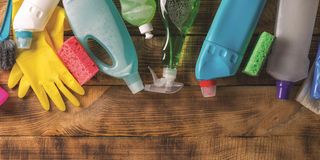Not responding to antibiotics? Blame it on your hand soap or toothpaste

Cleaning products.Triclosan is common in Kenyan products such as toothpastes and liquid soaps popular in laundry work.
What you need to know:
- Scientists say they have found that triclosan, a chemical often included in household items like hand soaps, toothpastes and cleaning products, is made of an antibacterial compound that causes antibiotic resistance.
- Triclosan is common in Kenyan products such as toothpastes and liquid soaps popular in laundry work.
Well, scientists say they have found that triclosan, a chemical often included in household items like hand soaps, toothpastes and cleaning products, is made of an antibacterial compound that causes antibiotic resistance.
Assistant Professor Hui Peng’s research group at the University of Toronto found that among thousands of co-occurring chemicals in the sludge, triclosan was found to be the predominant antibacterial compound impacting Escherichia coli (E. coli), which are bacteria found in the environment, foods, and intestines of people and animals.
The findings were published in the Environmental Science & Technology journal.
Triclosan is common in Kenyan products such as toothpastes and liquid soaps popular in laundry work.
Commonly known as ‘superbugs’, antibiotic-resistant bacteria are strains of bacteria that are not killed by antibiotics.
Experts say they are produced when continuous exposure to antibiotics causes bacteria to evolve over several generations to survive antibiotic effects.
These bacteria can be very dangerous to humans, especially those with impaired immune systems, and this is why between 2014 and 2016, there were 700,000 deaths around the world attributed to superbugs.
“Since there are so many different antibiotics in the sewage sludge, we were surprised to find that the majority of antibacterial activity of the sludge could be directly linked to triclosan alone,” said Holly Barrett, a PhD candidate in the Peng group and the study’s lead author.
In 2016, the US Food and Drug Administration banned triclosan from being used in antibacterial liquid soaps, and then a year later from being used in topical antiseptics found in healthcare settings.
In a then official statement, Janet Woodcock, the former director of the FDA’s Center for Drug Evaluation and Research, said: “Consumers may think antibacterial washes are more effective at preventing the spread of germs, but we have no scientific evidence that they are any better than plain soap and water.
“In fact, some data suggests that antibacterial ingredients may do more harm than good over the long-term.”
Healthy Nation found that neither the Kenya Bureau of Standards nor the Ministry of Health had issued any statements clarifying the Kenyan position on the matter.
“It’s still used in thousands of household and cosmetic products as well as in healthcare settings. While there are a few regulations in place to restrict the maximum amount of triclosan allowed in consumer products, even very low levels of this chemical may cause antibiotic resistant bacteria to form over time,” the lead researcher highlights.





